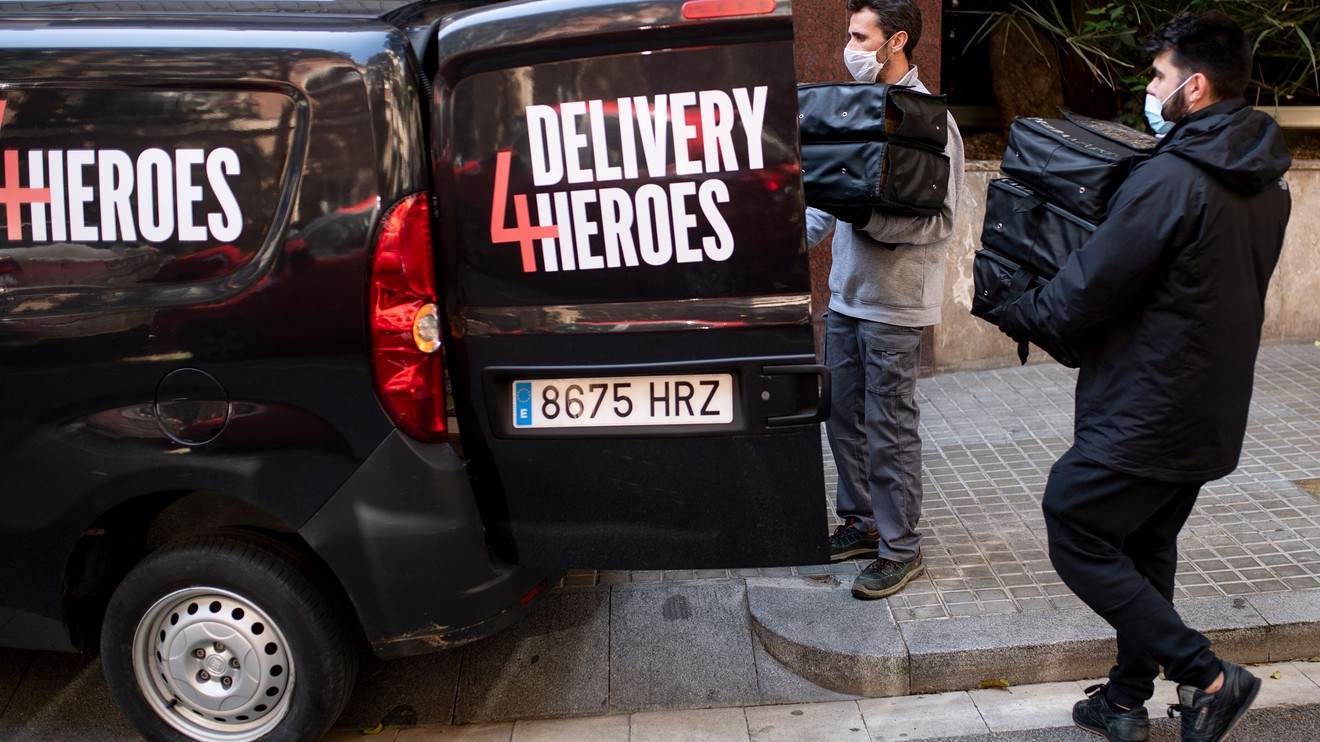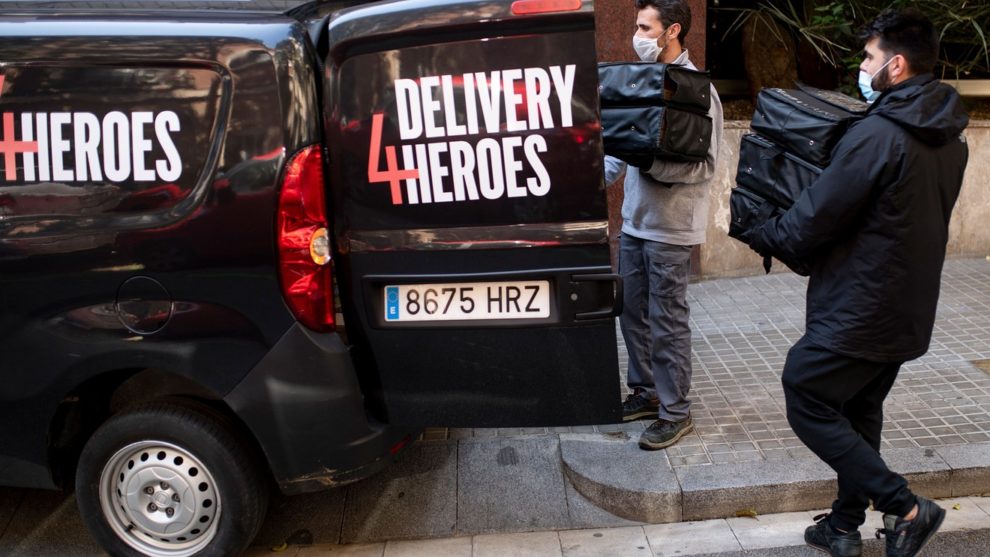
There was a glimmer of hope in Spain’s battle with the coronavirus pandemic on Sunday, when the country recorded its lowest death rate overnight since March 26.
Spain counted just 674 deaths, according to its health ministry, suggesting the daily growth rate in infections has slowed to about 5%, the lowest rate since tracking began. Spain now has 130,759 cases of COVID-19 and 12,418 fatalities, putting it ahead of fellow hot spot Italy in terms of case numbers (Italy’s numbers have not yet been updated for Sunday), according to data aggregated by the Center for Systems Science and Engineering at Johns Hopkins University.
Italy has 124,632 cases and at least 15,362 deaths, the highest death toll of any of the 183 countries that have been affected.
Globally, there are now 1.22 million cases of COVID-19, and 65,884 people have died. Another 252,538 people have recovered. The U.S. continues to show the highest number of cases at 312,249 with 8,503 fatalities. New York state remains the pandemic’s epicenter in the U.S.
There are 113,704 cases of the virus in New York state, according to the latest update from the New York State Health Department, and at least 3,565 people have died. Gov. Andrew Cuomo said the death toll rose by 630 in the 24-hour period from Friday to Saturday and warned that infections in the state have not yet reached an apex. The peak, he posited, may come in four to eight days.
Cuomo thanked the Chinese government for “helping facilitate” a donation of 1,000 ventilators to New York City. Cuomo also thanked Alibaba co-founders Jack Ma and Joe Tsai. That delivery was due Saturday.
He also thanked the governor of Oregon, Kate Brown, for sending New York 140 ventilators. Oregon’s apex is forecast to come in May, and Cuomo has pledged New York would help other states with equipment and personnel later in return for help now.
Read now:New York’s coronavirus death toll surged to 3,565 Saturday, an increase of 630 in the past 24 hours
Plus: The U.S. officially lost 701,000 jobs in March, but in reality millions vanished
See: Captain of coronavirus-stricken aircraft carrier relieved of command
On Saturday, President Donald Trump said the U.S. may be facing “the toughest week” of the COVID-19 outbreak in the country. “There will be a lot of death,” he said at a White House briefing. Pennsylvania, Colorado and Washington, D.C., are expected to become the next hot spots in the country after New York and Louisiana, he said.
Trump again touted the anti-malarial drug hydroxychloroquine as a possible treatment for the virus, even though experts have cautioned that it has not been tested or won approval from the U.S. Food and Drug Administration. Trump said the federal government was placing the drug in its Strategic National Stockpile, and even said he would consider taking it himself.
As MarketWatch’s Jaimy Lee has reported, the drug is in the early stages of testing in China, France and the U.S. as a treatment for COVID-19. Pharmacists are concerned that prescribing the drug for the virus has created shortages of the medication for patients with lupus and rheumatoid arthritis, two indications for which it has been approved.
There are also safety concerns. The Banner Health hospital system, based in Phoenix, said on March 23 that a man in his 60s had died and his wife, also in her 60s, was in critical care after the couple consumed a form of chloroquine phosphate used to clean fish tanks. The drug also has a number of adverse effects, like nausea and changes in mood, and can cause drops in blood sugar. Incorrect doses can cause coma, seizures and death.
Here’s what companies said about the impact of COVID-19 on Friday:
• American Airlines Group Inc. AAL, -6.66% will suspend 60% of its international capacity for the “peak” summer travel season compared with a year ago, in response to “record-low customer demand.” The suspensions include an 80% reduction in Pacific capacity, a 65% cut in Atlantic capacity and a 48% reduction in Latin America capacity. The air carrier is also suspending 25 summer seasonal flights until 2021 and delaying the launch of new routes.
• AutoNation Inc.’s AN, -2.45% sales of new and used vehicles fell about 50% in the last two weeks of March. About 95% of the markets the company generates its revenue from are under lockdown orders from federal, state and local governments. The company has placed about 7,000 workers on unpaid leave, has cut pay and frozen all new hiring. It has cut its advertising spend for the second quarter by about 50% and postponed more than $50 million of discretionary spending. The company has cut the pay of its executive chairman, CEO and president by 50%, and the board of directors is waiving retainer fees temporarily. The company had about $1.1 billion of liquidity as of March 31, and about $700 million of availability under a revolving credit facility.
• Bloomin’ Brands Inc. BLMN, -2.99% Chief Executive David Deno won’t be paid his base salary until further notice, while retaining his bonus. The board of directors will forgo any cash retainer until further notice. Bloomin’ Brands portfolio includes Outback Steakhouse and Bonefish Grill.
• Chico’s FAS Inc. CHS, -4.89% has adopted a short-term shareholder rights plan after stock price disruptions due to the pandemic. The plan aims to guard against any individual or group gaining control of the company in the open market without paying a premium.
• Cummins Inc. CMI, -0.36% is cutting pay for all its U.S. workers by 10% to 25%, in response to lower demand and customer shutdowns. The engine maker is reducing working hours for U.S. employees. Chief Executive Tom Linebarger’s salary will be reduced by 50%, and the compensation of its board of directors will be lowered by 25%.
• FedEx Corp. FDX, -6.36% expects to remain in compliance with its debt covenants, but indicated there was risk that it may need to amend the covenants if additional financing is required and results deteriorate further. The package delivery service has seen increased demand for its FedEx Ground delivery service in the U.S., as shelter-in-place measures boost demand for e-commerce, but the shift in sales mix is expected to hurt margins and operating results. Results have also been impacted by “significantly weaker global economic conditions.” Separately, FedEx implemented temporary surcharges on all international shipments, and temporarily eliminated its money-back guarantee for all delivery services.
• Lowe’s Cos. LOW, -0.79% is raising wages by $2 an hour for all full-time, part-time and seasonal hourly workers for the month of April, throughout the U.S. and Canada. The home improvement retailer also said it will close all stores by 7 p.m., which is an hour later than rival Home Depot Inc. HD, -1.44% Lowe’s will make masks and gloves available to all employees “who want them,” and has developed an app, which is available on employees’ hand-held devices, to implement a new customer limit protocol. The retailer also installed plexiglass shields at all points of sale and increased third-party cleaning shifts in the stores.
• Ocwen Financial Corp. OCN, -18.35%, a nonbank mortgage servicer and originator, pulled financial guidance. The company has about $264 million in unrestricted cash and expects to be fully compliant with its financial covenants at the end of the first quarter. It also has undrawn credit availability of $104 million under its servicer advance funding facilities, $225 million under its MSR financing facilities, and $156 million under its mortgage warehouse funding facilities. For now, Ocwen has not laid off or furloughed any employees and has no plans to cut pay.
• Tupperware Brands Corp. TUP, -2.77% has drawn down $225 million from its credit agreement. The company is using $50 million for working capital in the second quarter, and the remaining $175 million is a proactive measure against the pandemic.
• Under Armour Inc. UA, +8.56% will incur pretax restructuring and related charges in the range of $475 million to $525 million in 2020 related to a plan that the athletic company announced on Feb. 11, before measures to manage the pandemic began. The charges include about $290 million to forego opening the New York City flagship store, $25 million in employee severance and benefit costs and $95 million in contract termination and other restructuring costs. The company expects to realize $40 million to $60 million in pretax benefits for the year and has withdrawn its first-quarter and full-year guidance. The company’s stores will remain closed indefinitely and staff at the full price and outlet stores as well as about 600 U.S. distribution facility workers will be temporarily laid off starting April 12.
• Walt Disney Co. DIS, -3.18% will begin furloughs on April 19. Disney has kept all of its workers on payroll despite closing theme parks and closing down movie shoots, but said that would end later this month.
• W.R. Grace & Co. GRA, -0.55% expects first-quarter adjusted earnings per share to be at the high end of the guidance range of 65 cents to 72 cents provided in early February. The specialty chemicals company said its outlook included a negative EPS impact of about 6 cents to 10 cents from the effects of the pandemic. The company is expected to report first-quarter earnings on April 30. W.R. Grace said it expects its full-year results to be negatively impacted by the pandemic, but said its manufacturing operations and supply chain have so far not been materially impacted. “Our businesses are designated as critical infrastructure by the U.S. Department of Homeland Security,” said Chief Executive Hudson La Force.
Additional reporting by Tonya Garcia, Tomi Kigore, Jaimy Lee, Claudia Assis, Jeremy Owens, Andrea Riquier and Jon Swartz.









